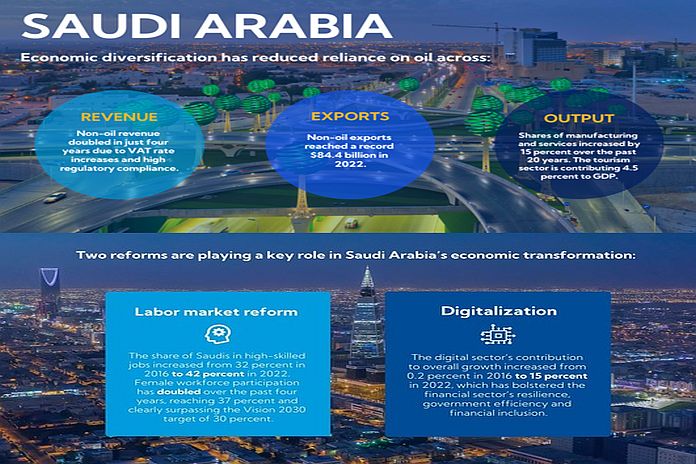USA / SAUDI ARABIA – Saudi Arabia’s economy is undergoing a transformation, as it implements reforms to reduce oil dependence, diversify income sources, and enhance competitiveness. This year marks an important juncture as the midpoint of Saudi Arabia’s ambitious Vision 2030 journey.
As shown in the latest IMF annual review of the country’s economy, progress has been most notably reflected in non-oil growth, which has accelerated since 2021, averaging 4.8 percent in 2022. Despite lower overall growth reflecting additional oil production cuts, non-oil growth will remain close to 5 percent in 2023, spurred by strong domestic demand.
Diversification has been driven by improvements in the regulatory and business environment. As a result of a new set of laws to promote entrepreneurship, protect investors’ rights, and reduce the costs of doing business, new investment deals and licenses grew by 95 percent and 267 percent in 2022, respectively. In addition, the Saudi Investment Fund (PIF) has been deploying capital, including to help stimulate private sector investment.
Charting the course ahead
The economy’s non-oil growth has been spurred by strong domestic demand, particularly private non-oil investment. Sustaining this performance requires pursuing sound macroeconomic policies and maintaining the reform momentum, irrespective of developments in oil markets.
Challenges ahead include making sure large projects generate returns and boost productivity, which are vital for sustained economic growth and will help further diversify the economy. There is a need to continue the ongoing efforts to foster a more conducive environment for innovation and invest in workforce skills that complement the diversification agenda. Streamlining fees and taxes faced by businesses – particularly at local and city levels -will further boost private sector development. The PIF’s growing role in the economy should continue to stimulate private-sector investment. Lastly, rigorous monitoring and evaluation can help minimize risks from targeted interventions and industrial policies, ensuring that these policies (which are not a substitute for broader structural reforms) attain the intended benefits.
- Amine Mati is an Assistant Director and Sidra Rehman is an Economist. Both are in the IMF’s Middle East and Central Asia Department.





